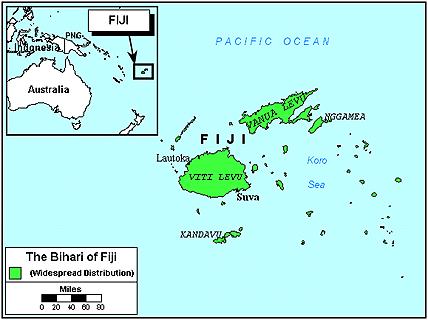|
|
Prayer Profile
The Bihari of Fiji
![[IMAGE]](../images1/0251.jpg) The Bihari of Fiji are immigrants from India. As a result of depressed social conditions in India during the late nineteenth and early twentieth century, numerous Indian Hindus and Muslims signed five-year contracts to work as indentured servants in the Fiji Islands sugar cane fields.
The Bihari of Fiji are immigrants from India. As a result of depressed social conditions in India during the late nineteenth and early twentieth century, numerous Indian Hindus and Muslims signed five-year contracts to work as indentured servants in the Fiji Islands sugar cane fields.
However, the traumatic move pushed them into even greater economic turmoil in a strange land. Herded into a ship's cramped quarters, they were forced to eat, drink, and live next to people of every caste. Such close associations threatened their own caste identity. The plantation system in Fiji and the native Fijians, who looked on them with contempt, further added to the loss of their Indian value systems. When their contract was completed, many leased land and remained as peasant farmers, and as the years passed, most Bihari lost their ties with India. Today, most of Fiji is a mixture of groups with a variety of different social, ethnic, and religious origins.
What Are Their Lives Like?
The original tenant structure was supposed to be small enough so the tenant could farm the holding without outside help. Although it is possible for a farmer to grow most of the rice and vegetables his family needs, this rarely happens. Instead, farmers buy what they need and go into debt until the harvest brings in their yearly income. Bihari farmers commonly hire assistants to cut their share of cane.
Sugar cane and rice are the major crops, and these are counted on for economic survival. Today, most Bihari farmers still lease their land. Almost all cane farmers have either horses or bulls as work animals and all families have at least one milk cow for their own use.
The quality and materials making up the various farm buildings vary according to the owner's wealth. Structures may be only small thatched huts with dung-plastered floors or they may be larger, well-built iron-roofed houses.
Rural Bihari Indians generally live on isolated homesteads scattered throughout areas where land is available for lease. These homesteads make up a settlement—a geographic term that does not necessarily identify a single social community. A settlement headman is responsible for keeping order in the isolated rural areas and for reporting serious offenses to the district government (Fiji is part of the British Commonwealth).
A country store is usually nearby, and these are social centers as well as supply stations. The Bihari generally construct schools for their own children, who often surpass their Fijian counterparts. A small urban population, composed of shopkeepers, tailors, or other trades, has evolved among the Bihari.
What Are Their Beliefs?
Typical Hindu roles of caste and religion appear to be modified on Fiji. In India an individual is born into a particular caste associated with a trade or profession. These castes are ranked from high to low in terms of purity or pollution. One could marry only within one's caste and members of different castes usually have nothing to do with one another. On Fiji, however, marriage according to caste is no longer mandated.
Religious association is a definite barrier, and tension does exist between the Bihari Hindus and Muslims. Both cultures normally keep obvious religious prohibitions. For example, following Hindu belief, most Hindus are reluctant to sell cattle for slaughter. And although both Muslims and Hindus generally observe feasts, fasts, festivals, and holy days, they have less significance for the whole community.
What Are Their Needs?
Approximately four percent of the Bihari are Christians. Hindus represent seventy-six percent and Muslims twenty percent of the people. Portions of the scriptures have been translated into Bihari, and the Jesus film is available in the Bihari language.
There are no Christian broadcasts in Bihari. Only one missions agency is currently working among the Bihari.
Prayer Points
- Pray that God will strengthen and protect the small number of believers among the Bihari in Fiji.
- Pray that their lives will be a strong witness for the Gospel.
- Ask God to reveal Himself to the Bihari through the Christians among them.
- Pray that God will supply qualified linguists to complete the translation of the Bible into Bihari.
- Ask God to create a hunger in the hearts of the Bihari and an openness to the Gospel of Jesus Christ.
- Ask the Lord of the harvest to send forth laborers to the Bihari in Fiji.
- Pray for the effective use of the Jesus film.
- Ask the Holy Spirit to soften the hearts of Bihari Hindus and Muslims towards Christians so they will be receptive to the Gospel.
- Ask the Lord to raise up strong local churches among the Bihari.

Statistics
Latest estimates from the World Evangelization Research Center.
THE PEOPLE
- People name: Bihari
- Country: Fiji
- Their language: Bihari
- Population:
- Largest religion:
- Christians: 4%
- Church members: 1,160
- Scriptures in their own language: Portions
- Jesus Film in their own language: Available
- Christian broadcasts in their own language: None
- Mission agencies working among this people: 1
- Persons who have heard the Gospel: 10,700 (36%)
- Persons who have never heard the Gospel: 18,300 (64%)
THEIR COUNTRY
- Country: Fiji
- Population:
- Major peoples in size order:
- Major religions:
- Number of denominations: 20
© Copyright 1997
Bethany World Prayer Center
This profile may be copied and distributed without obtaining permission
as long as it is not altered, bound, published
or used for profit purposes.
![[HOME BUTTON]](../graphics/home.jpg)
![[CALENDAR BUTTON]](../graphics/calico.jpg)
![[LIST BUTTON]](../graphics/listico.jpg)
[Home]
[Calendar]
[Country List]
|